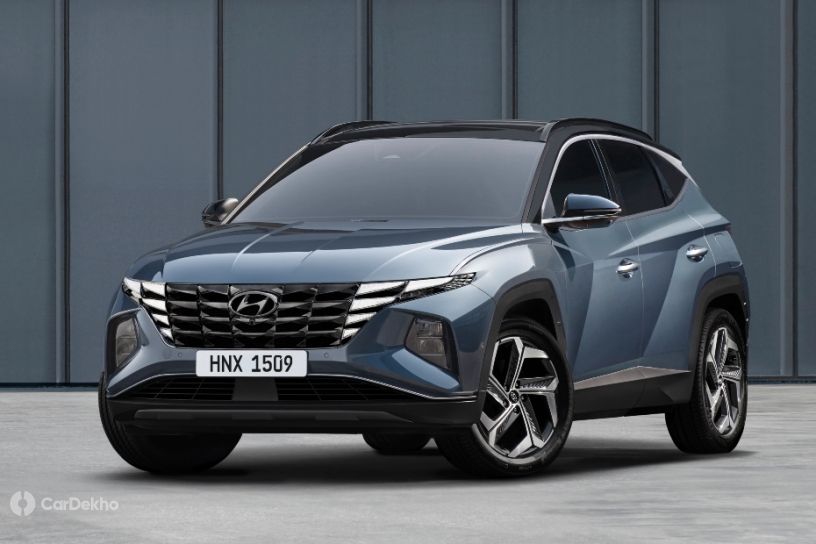Next-gen Hyundai Tucson Unveiled; Likely To Arrive In India By 2022
Modified On Sep 15, 2020 04:05 PM By Sonny
- Write a comment
Gets a sportier design, clever lighting and new hybrid powertrain options
-
Fourth-gen Hyundai Tucson unveiled ahead of Korean market debut.
-
It is bigger than before and will be offered in short or long wheelbase versions.
-
Gets a choice of 9 engines across markets including new hybrid and plug-in hybrid powertrains.
-
It features a digital instrument cluster and touch control centre console without using a massive central display.
-
New Tucson could arrive in India by 2022 to continue rivaling the Jeep Compass, Tata Harrier and others.

The fourth-generation Hyundai Tucson has made its global premiere. It features an all-new design and will be offered in long and short wheelbase options for the first time. Hyundai will also offer it with a choice of hybrid and plug-in hybrid powertrains in select markets.
While the Tucson is a bit pricey in the Indian market, it is one of Hyundai’s best-sellers in the global automotive space. This new-gen model features a futuristic design that Hyundai’s designers call ‘parametric dynamics’ and uses jewel-shaped details, especially on its front grille. This grille also has a special party piece with the integrated LED daytime running lights that are barely distinguishable when turned off. When on, it looks like the corners of the grille themselves have lit up. Overall, the new Tucson looks a lot sportier and more premium too.

Around the rear, it has a lightbar that spans its entire width with double-fang tail lamps on each side. Another cool trick is that the rear windscreen wiper tucks away under the roof-spoiler so it doesn’t interrupt the rear-end design of the new Tucson. It’s bigger too. However, the exact measurements are yet to be revealed and will vary depending on the market.

The new Tucson’s cabin is designed to be and feel more spacious than before with a clean layout and a panoramic sunroof. Its dashboard is almost flat to the horizon with a cascading centre console that features a gloss black finish. The AC vents are horizontal and sleek as well and are integrated discreetly into the new dashboard design. It features two 10.25-inch displays - one for the driver’s instrument cluster and the other is a touchscreen unit for the infotainment system. Most of the centre console now feature touch controls and the lack of physical buttons leaves the design uninterrupted. The central display is under the vents followed by media controls. Its climate controls are below that with their own display.
The centre tunnel is a smooth design as well since the new Tucson features shift-by-wire technology for the automatic transmission. Thus it has buttons to switch between drive, neutral, reverse and park with an electronic parking brake too. It also houses the toggle to switch between driving and traction modes while the front section has buttons for the ventilated seats, park assists and hill descent control.

In terms of features, the global-spec Tucson will get a Car-to-home function to remotely control smart home appliances from the car. It’s like the flip side of cabin pre-cool since it can pre-cool the home ahead of your arrival. The climate control will also include air purification. The Tucson also gets Hyundai’s Blue Link connected car tech for telematics and remote functions from upto 90 feet away. It gets a Bose sound system for the infotainment system. The powered tailgate allows access to the cavernous boot with a claimed luggage capacity of over 620 litres.
As an international product, the new Hyundai Tucson will also include a host of active safety systems and driver assists. This includes features such as collision avoidance, stop-go safe exit warning, lane assists, remote smart parking assist and adaptive cruise control. Most of these features are likely to be offered on the India-spec model.

Hyundai will offer the fourth-gen Tucson with a total of 9 engines across different markets. The petrol options include the 2.5-litre engine (190PS), 2.0-litre engine (156PS) and a 1.6-litre turbocharged unit which is also available with 48V mild-hybrid tech in two states of tune (150PS/180PS). Meanwhile, the diesel engines on offer include a 1.6-litre unit in two states of tune (115PS/136PS) as well as a mild hybrid option, and a 2.0-litre unit (186PS). The hybrid and plug-in hybrid powertrains include the 1.6-litre turbo-petrol engine and offer a combined output of 230PS and 265PS respectively. Hyundai’s new hybrid powertrains utilise the brand’s Continuously Variable Valve Duration (CVVD) technology to offer a balance of efficiency and performance. The various transmission options are not yet detailed but it will continue to be offered with AWD.
While Hyundai recently launched the facelifted version of the third-gen Tucson in India, the new-gen model is unlikely to arrive before 2022. The Tucson is currently the brand’s flagship offering in India and rivals the likes of the Jeep Compass, Skoda Karoq, Volkswagen T-Roc, Tata Harrier and MG Hector. It retails between Rs 22.30 lakh and Rs 27.03 lakh (ex-showroom Delhi) with the choice of both petrol and diesel engines.
Read More on : Hyundai Tucson Automatic
2 out of 2 found this helpful















